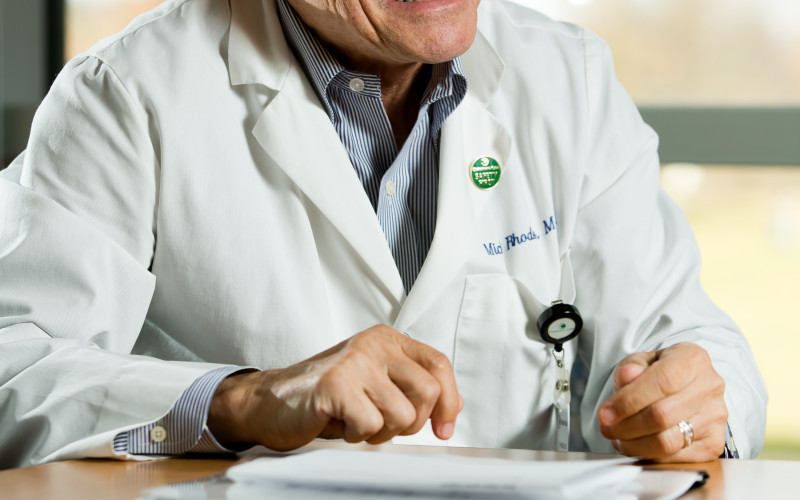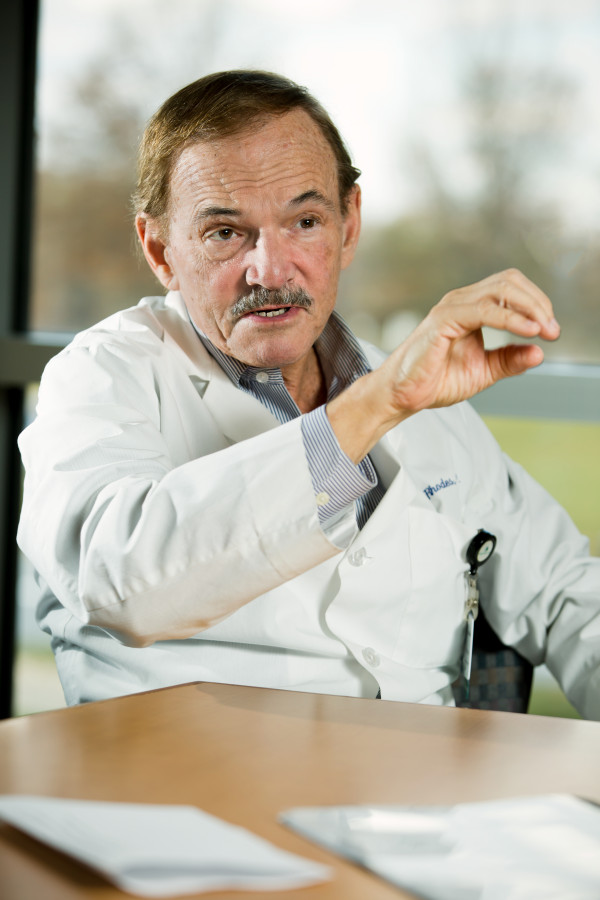Q & A with Michael Rhodes, M.D.

Michael Rhodes, M.D., FACS, retired Jan. 1 after more than 19 years of service to Christiana Care — 18 years as chair of the Department of Surgery. Dr. Rhodes joined Christiana Care in 1995, becoming a key leader during the transformation of the Medical Center of Delaware to Christiana Care Health System in 1997. He led a surgical staff of more than 200 surgeons representing 13 specialties who, together, performed more than 46,000 operations each year in 55 operating rooms.
He is a professor of surgery at Sidney Kimmel Medical College at Thomas Jefferson University in Philadelphia. Since finishing his tenure as a department chair in 2013, Dr. Rhodes has applied his invaluable knowledge and experience at the Christiana Care Value Institute as the senior consultant for advances in medicine.
Much has changed since his years as a young trauma surgeon running a MedEvac helicopter program — and he expects many more changes in the years ahead as Millennials take over the medical reins and employ new technology. Yet he contends that the importance of looking a patient in the eye, listening carefully and showing respect will always top the list in practicing good medicine.

Q: What’s the most significant way that surgery has changed throughout your career?
A: The most critical change, by far are the advances in and appreciation of the pathophysiology of disease — that is the things that anatomy, physiology or chemistry leave behind that can create problems (for example what we now know about clots). With the knowledge we have today, we can diagnose disease often with just two or three symptoms.
Of course, I have also seen really major breakthroughs in technology that are clearly lifesaving; things such as CT and portable ultrasound that allow us to look at the organs on the screen. And defibrillators! Those are incredibly amazing. Technology has certainly changed things dramatically.
One thing that hasn’t changed is the great deal we can learn from the expression we see on the patient’s face. The most important thing in evaluating a patient, by far, is looking at his or her facial expression. It tells you 90 percent of what you need to know as a clinician.
When I was a student at Hahnemann Medical School from 1965 to 70, communication with patients was all done with hands, eyes, voice and facial expressions. A lot of that was because we simply did not have technologies we have today. Yes, we had stethoscopes, drew blood, took pulse rates (with our fingers!) and measured EKGs, but we learned to listen to our patients to figure out what was going on with them.
Today, we have the benefit of all of this wonderful technology, but at the same time it can get in our way. In many ways, we need to re-learn these skills of basic interpersonal communication.
Q: It sounds like you’re talking about respect, partnership — concepts that are essential to The Christiana Care Way.
A: Yes. Patients can be afraid of the white coat, stethoscope, badges and other clinicians in the room taking notes. One thing we can do to help relieve anxiety is to touch the patient’s hand when you walk in and introduce yourself. Sending out this signal of respect makes all the difference in the world. It also helps to explain what you’re doing and what the patient can expect to feel.
In the end, what matters — what has always mattered — is not the technology and not the science, but the human interaction that takes place between doctor and patient. A little bit goes a long way.
I once asked a patient to share his experience with alcohol. “Doc, to tell you the truth, I stay away from it,” my patient too quickly answered. And then I saw his wife’s hand gently touch his shoulder, and heard her say, “Tell the doctor the truth.” Turns out, my patient had been drinking more than he should, and once it was out in the open, we were able to deal with it respectfully. Having someone from the family present has always given a good sense of balance.
Q: What changes do you envision for the next generation of surgeons?
A: Things certainly have changed — and gotten busier. When I arrived at Christiana Care we were the 37th busiest surgical hospital in U.S. Last year we were the 8th, and the 4th busiest on East Coast!
There are four key things I’ve been keeping my eye on through my work with the Value Institute, which I believe will have the most dramatic impact on medicine:
1. Genomic medicine: I’m convinced that by 2020, we will be treating cancer patients with reparative DNA (restoring, replacing or enhancing organ or tissue function). This will be a huge breakthrough and will dramatically cut the cost of health care, as what used to involve costly hospitalizations will be done outpatient, likely for a little under a thousand dollars. By 2030, we’re estimated to have a shortage of 150,000 physicians in the US (25,000 too few surgeons), but we may not need all of them with reparative DNA.
2. Hyperbaric oxygen: Studies show that ventilated stroke patients treated in a hyperbaric chamber are showing improved outcomes in mental capacity by as much as 15 percent. This technology will also be helpful treating head injury and post-traumatic stress injury. I believe it will soon become part and parcel of what we do in treating these patients.
3. Telehealth, or telemedicine: We’re leveraging this technology at Christiana Care, and it’s growing all over the country. These amazing devices read oxygen, blood pressure, hemoglobin levels and allow us to watch people on video to save them driving 200 miles to see a doctor. This is going to make huge difference.
4. Detoxification: It’s hard to believe with today’s emphasis on healthy eating, but a lot of the foods that we eat and the air that we breathe are toxic. Many foods have mercury, lead, arsenic — all poisonous to our system and can cause problems with brain function. Detoxification will become more and more important.
Q: What advice would you give to a young person just starting in medicine?
A: Take advantage of the IT devices your generation has to learn the basics of anatomy and physiology. That knowledge takes all priorities. Once you have a handle on anatomy and physiology, you are one step ahead. Also take time to learn the different mindsets, the psychiatry, of different age groups. Understand that older people are significantly more worried about what’s going to happen to them because of where they are in their lifespan.
My most important advice to residents: Make sure you get enough sleep! You need to be sharp when you’re rounding with patients. Pay attention to what the patient tells you. Listen. That’s doesn’t just mean hearing their voice, but listening to how they sound. Respect is clearly the most valuable tool that any medical student, nurse or resident can manifest to a patient. If the patient feels respected, that will help them get better.
Q: Are you optimistic about the future of medicine?
A: I have been very impressed with the young medical students and interns I’ve rounded with. They pay attention to people; I see enthusiasm. It seems to be a more respectful global environment where people are trying to help other people. I’m excited for the Millennials!
Our world and medicine are clearly changing. By 2030, things are going to look a lot different. Our world is not country-centric anymore; we’re a global world now. I’m definitely optimistic.
Q: And the future for Christiana Care?
A: When I was a kid in Pennsylvania, we used the phrase “Dela-WHERE?” That’s no longer the case! Christiana Care is known all over the U.S. for the work that’s done here. It’s phenomenal. We now have the Helen F. Graham Cancer Center & Research Institute, the Center for Heart & Vascular Health, the John H. Ammon Medical Education Center, the Value Institute, robotic surgery at the new Wilmington campus — The change is really amazing; a lot of people deserve a lot of credit for what’s happened here.
I also need to say that the nursing and residency staff here are absolutely phenomenal, especially the way they treat other people. It’s really a very respectful environment; I see it in the hallways here all time. We have a great team here at Christiana Care.